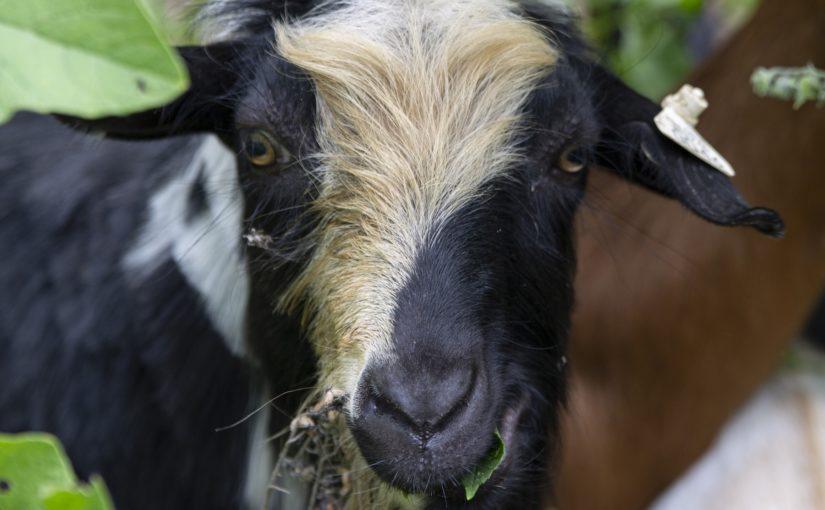APPLETON – Goats are busy working the garden. We’ve got the “Goat Cam” footage to prove it.
Ten goats — two Nigerian dwarf goats and eight fainting goats — have settled into the SLUG garden on the Lawrence University campus, and for the next week will continue to devour unwanted thistle and burdock weeds.
The goats — supplied by Steve Anderson of Mount Morris, owner of the newly launched Goat Busters farm — arrived last Tuesday after Lawrence biology major and SLUG garden manager Floreal Crubaugh ’20 put out a call for rented goats.
“I was looking for more sustainable ways to control the weeds than applying herbicides, and more efficient ways than pulling them up manually,” Crubaugh said.
We attached a GoPro camera — our “Goat Cam” — to the back of one of the goats. We let Blu show us the work in progress on a Monday morning in the garden. Be warned: the footage is adorable and may steal a large chunk of your day.
The SLUG (Sustainable Lawrence University Garden), a student-run nonprofit enterprise that uses sustainable agricultural methods to nurture a honeybee apiary, a fruit tree orchard, a vegetable garden and a hoop house, has been a fixture on the Lawrence campus for nearly two decades.
But the use of goats is a first.
Crubaugh went in search of goat rentals after successfully seeking monies through a Lawrence sustainability grant. The thistle and burdock weeds on the east end of the garden had gotten unmanageable, and the student volunteers couldn’t keep up, she said.
“I thought, what if we got some goats in here and they basically do the work for us, all while providing a lot of benefits for the garden, like fertilizer and digesting the seeds?” she said. “It was a really impossible project to take care of as humans, so we turned to goats.”

Floreal Crubaugh ’20 holds one of the goats in Lawrence’s SLUG garden. Crubaugh, the garden manager, brought in goats to help control troublesome weeds that have overgrown a portion of the student-run garden.
See more photos of the goats in the SLUG garden here.
More on sustainability efforts at Lawrence here.
Crubaugh, Anderson and LU officials first sought permission from the City of Appleton to allow for the goats. They were granted a special exemption for three weeks.
Anderson installed a temporary fence last Monday, then delivered the goats the following day.
“With the university always being progressive and thinking ahead, I think this is going to encourage the city and the county to take goats more seriously,” Anderson said. “Invasive plants are a widespread problem, whether it’s these weeds or buckthorn or whatever the issue is.”
It’s the first time he’s rented out the goats, something he wants to do more of in the future.
Anderson, who initially got the 10 goats this spring to help tackle a growing buckthorn problem on his family’s 30-plus acres in Waushara County, said he hopes to expand his goat herd and eventually connect with cities and counties to help control weed and invasive plant issues in parks and along hiking trails.
“They eat the seeds,” Anderson said of the goats. “That’s one of the biggest advantages of the goats is that they digest the seeds. The birds just spread it. But goats will actually digest it, so there’s no new growth.”

Steve Anderson operates Goat Busters out of Mount Morris. He delivered 10 goats to the SLUG garden at Lawrence. They’ll remain in the garden through July 19.
Visitors are welcome to check out the goats and the work going on in the SLUG garden, located at the base of the hill just off of Lawe Street. Most of the goats are fairly shy. But a couple are outwardly social and are happy to greet visitors to the garden.
Crubaugh, who can be found tending the garden most days during the summer, hopes her work in SLUG will set the table for career opportunities in the sustainability field after she graduates.
“This is a good way to get a taste of that,” she said.
The senior from Bloomington, Illinois, had worked with goats while helping relatives who operate a cattle ranch in Montana. She saw the sustainability benefits first hand.
“I’d go out there during my summers as a kid and help bottle feed the orphan goats, and I’d watch the goats just move across the fields like a sundial, just mowing everything down,” she said. “That’s where this idea sort of originated for me.”
Ed Berthiaume is director of public information at Lawrence University. Email: ed.c.berthiaume@lawrence.edu




